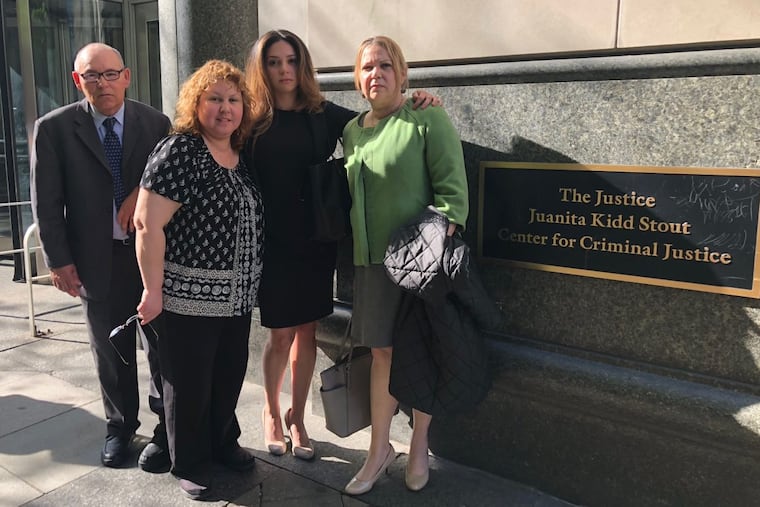Couple turn friend in for murder and then flee the city | Helen Ubiñas
"Honestly, you don't get to see s- like that and call the cops, you don't do that."

Four days after going to police to turn in a man they had known since they were kids in Puerto Rico, Antonio Vicenty and Valery Diaz left. The couple left jobs, pulled their kids out of school, and fled the city that was home, only to return for the preliminary hearing and last week's trial.
Of all the reasons that keep people from reporting a murder in Philadelphia, no other story I've heard brings it home quite like this.
I spent the week at the trial of Leonaldo Rivera, the man charged with killing 34-year-old Alejandro Rojas-Garcia in 2015.
Three years is a long time. For both sides. For the family of the victim, but also for the man on trial.
When Rivera's attorney, Patrick Link, said that his client had been placed on a conveyor belt of a broken criminal justice system, it was hard to disagree.
It was heartbreaking to watch friends and family in Courtroom 1007 sit through clinical details of the death of a loved one, how more than a dozen bullets were pumped into his car, five striking him, one piercing his face and shattering some teeth before lodging in his tongue. Another passed through a lung before hitting his heart. A friend, who sat in the passenger seat, was also struck. He lived, but the bullet remains in his chest.
As I sat in the courtroom, I couldn't help but study the faces of family members of other homicide victims who came to support the Rojas-Garcia family – mothers and sisters of lost loved ones who haven't found justice.
Who might never.
The ties that bind in this city are close; familial and neighborhood connections can often cut off any chances of justice.
On the night of Garcia's death, Vicenty and Diaz were with Rivera at a late-night concert at Tierra Colombiana, a Latin restaurant and club on North Fifth Street. Rivera was dating Diaz's cousin, who also was there.
Later, they all went to an after-hours club nearby on Macalester Street.
As they were leaving about 4:30 a.m., Vicenty testified that he saw Rivera fire into Rojas-Garcia's car. (Why is still a mystery – maybe because Rojas-Garcia flirted with Diaz's cousin.) Diaz testified that later at the couple's house Rivera admitted to it.
How Vicenty and Diaz acted toward Rivera after he confessed was one of the more bewildering details of the case. Why would they let him into their home after the shooting? Why would Valery Diaz serve him a plate of food? Why not go directly to the cops?
The couple waited until they saw themselves in surveillance video released by police before they came forward.
Rivera's lawyer insisted they were trying to distance themselves from what really happened out there.
The couple had another reason: Fear.
"Honestly, you don't get to see s— like that and call the cops, you don't do that," Vicenty said. "It's not good, man. I got kids. I got to stay away from this as much as I can."
But then they saw themselves on TV, and saw Rojas-Garcia's mom, Aleida, pleading for someone to come forward.
"I just feel really bad for the kid, the one who got killed and his family," Vicenty said, choking up. "I saw his mom on the news. I felt so bad."
The courtroom was full on most days, largely with family and supporters of the Rojas-Garcia family. But there were a handful there for Rivera too, including Jose Rivera, a relative who said he was like a father to the defendant.
Every day, the elder Rivera sat nervously. And every day he brought the defendant a fresh shirt, one brighter than the next, for him to wear in court.
"I promised," he said.
On the other end of the courtroom, Wilfredo Rojas, the victim's father, said he felt for Jose Rivera. Except that no matter what happened, Rivera's loved one would still be alive. No verdict would bring Rojas'son back.
On Friday, a jury found Rivera guilty of murder. Rojas-Garcia's family was relieved and grateful, especially to Vicenty and Diaz.
Rojas-Garcia's mother said she was sorry their lives were destroyed along with her family's. But if others showed their courage, she said, maybe more people would hesitate before so recklessly taking another person's life.
Vicenty and Diaz weren't there to hear the verdict that came with a mandatory life sentence or to hear the family's appreciation for helping them get justice.
As soon as they were done testifying, the couple were gone.